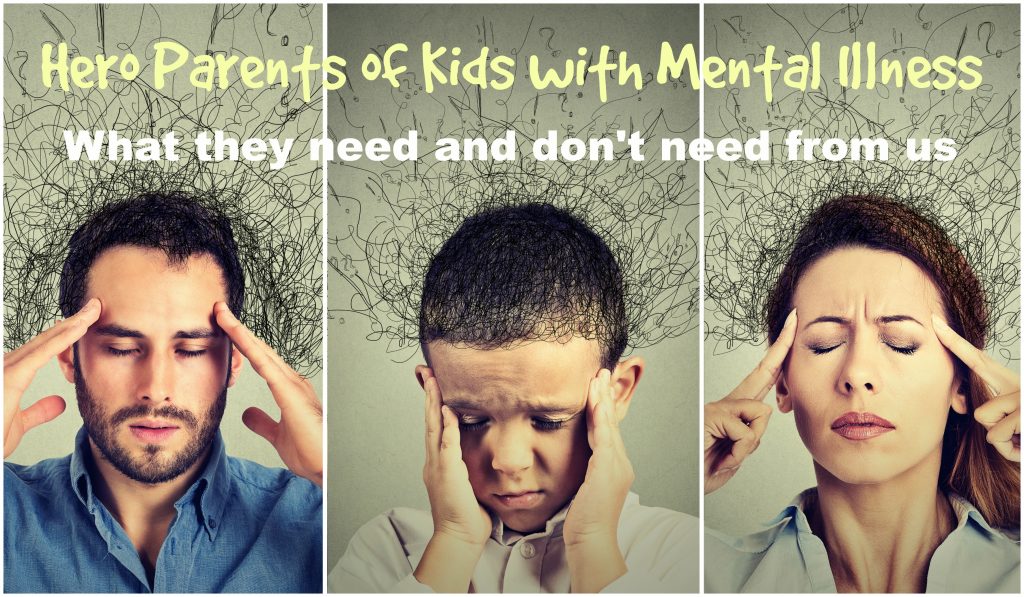Podcast: Play in new window | Download
Subscribe: RSS
Get the picture? It’s not easy for parents or their kids who suffer with mental illness. If you follow my writing you know I refer to mental illness disorders as “intruders”. Conditions like depression, anxiety, or ADD, intrude in a person’s life, not to mention the family too. It’s not easy on anyone! Parents who raise kids with mental illness are heroes. Plain and simple. They have been placed in charge of helping kids navigate a world that is not in sync with their brains. General parenting books do not work in this household. They read more complex books dealing with developmental problems such as neurological compromises, attachment disorders, emotional and behavioral dysregulation, impulse control, and sensory or social integration problems. Depending on the mental illness, adapting in a social environment comes with it’s own unique set of challenges. Kids may display unruly or oppositional behavior. They don’t readily listen to direction and may defy parents or act out publicly, often creating an embarrassing scene. Because this behavior fails to meet social norms, kids with mental illness and their parents are often misjudged. All parents fear failure. Parents of kids with mental illness experience this exponentially. They wonder what’s wrong with their approach and why it appears to be so much easier for other parents. They eventually come to understand that kids with arrested development need a modified approach in parenting that fits with their unique needs. Most of all they worry if their kids will successfully launch as independent adults. It takes courage and consistency to be a hero parent. Most importantly, it requires a boatload of unconditional love. So, if you are a friend, neighbor, or relative of these hero parents, here are a few things they need and don’t need from us.They don’t need us to fix them.
Do not offer unsolicited advice. You may have good intentions, but do not take it upon yourself to give them parenting advice. Parenting is not a “one size fits all” skill.They do need us to understand them.
The best way to understand them is to get to know them. Listen and be open to learn about the world they live in. Their story is unique and deeply personal. Making an effort to get to know and understand them will give you insight and empathy–not sympathy.They don’t need us to judge their parenting.
Hero parents don’t feel heroic on the job. They are hard on themselves. They feel our eyes on them and their kid. The disapproving look, roll of the eyes, or whispered comment to a friend, don’t go unnoticed. Judgment on their child or parenting is based on ignorance and is unfair. Please don’t do it.They need us to accept their family.
Acceptance is a fundamental social need. Families with mental illness crave acceptance too! They do not want to be marginalized in social events. Please don’t avoid them. Have them over to your home.They don’t need us to feel sorry for them.
Feeling sorry for parents of kids with mental illness is veiled judgment. It’s as if your saying, “Your mentally ill child is the cause of your struggles. Your life would be so much better if he/she was normal.” These heroes are not victims. They are fellow parents who struggle just like you. It just so happens their role is more challenging due to the intruder of mental illness.They do need us to support them.
They don’t need your sympathy. They need your support. Adapt to their social needs and do the best you can to help. Learn about the mental illness and how to modify your approach interacting with their child or providing back-up to the parent.Here are a few practical ways you can meet their need.
- Spend time with their family. Have them over to your home.
- Give them a night out by watching their kids.
- Offer practical support, and extra set of hands when they are dealing with an episode.
- Add humor to their life.
- Listen, offer a shoulder to cry on, a friend to lean on.
- Pray for their family

